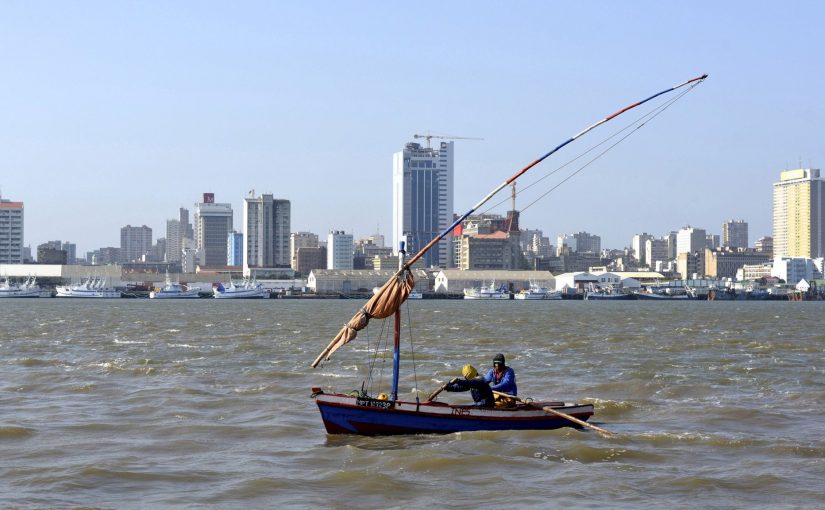Mozambique: Banks cut benchmark interest rate to 18% in May
Kroll audit finds companies not operational and badly run – AIM report

Lusa (File photo) / A view of Maputo
The full audit report from the company Kroll Associates into the three security-related concerns, Ematum (Mozambique Tuna Company), Proindicus and MAM (Mozambique Asset Management), finds that none of them are operational, and there is little prospect of any of them making a profit in the foreseeable future.
Kroll’s analysis of the business plans and feasibility studies of the three companies showed that “they were expected to generate combined operating revenue USD 2.3 billion by December 2016”.
But nothing of the sort happened and by the time Kroll was writing the report “negligible revenue has been generated and the Mozambique companies can only meet debt obligations with the financial support of either shareholders, the Ministry of Finance or the contractor (the Lebanon-based group, Privinvest).
The audit found what are delicately referred to as “considerable management failings in meting contractual obligations and establishing the local infrastructure required to enable the contractor to deliver the intended assets and services”.
Measures that were absolutely basic to ensure a minimum of operations had not been taken. Thus Kroll found that “Proindicus does not have an operational satellite package; Ematum currently does not have permits for its fishing vessels; and MAM has only recently obtained access to a shipyard in Maputo that is undergoing an upgrade to enable the maintenance of vessels”.
Thus despite borrowing over two billion US dollars from the banks Credit Suisse and VTB of Russia, with illicit government guarantees, the companies did not take simple precautions to ensure any level of viability.
Privinvest told Kroll it repeatedly tried to obtain answers about operational issues from Antonio do Rosario, the agent of the State Security and Intelligence Service (SISE), who is the chairperson of all three companies, apparently without much success.
According to the documentation provided by Privinvest, the trainees sent by Proindicus “did not have the necessary pre-course skills and qualification or appropriate technical knowledge” to undertake the courses on handling the vessels supplied to the company. The trainees did not even have appropriate clothing for the training. Personnel trained to operate the Proindicus Control and Command System were unable to do so, because they were called up for military service.
This is quite extraordinary since it is always possible to postpone military service. As a senior security official, Rosario was in an excellent position to secure such a postponement.
As for Ematum, the company had not even secured the land and buildings needed to equip the planned coordination centre.
The Proindicus business plan estimated that the company would generate operating revenues of 607.8 million dollars by December 2016. After deducting operational costs of 29.5 million dollars, this would leave over 556 million dollars as cash flow available for debt servicing.
These optimistic projections were based on the assumption that gas companies operating offshore would pay Proindicus for its security and protection services. Such contracts with the gas companies would provide around half of the Proindicus projected revenue. But none of the companies signed contracts with Proindicus, or showed an interest in doing so. Other possible sources of revenue, such as protecting fishing boats or tourist vessels, proved equally illusory.
Kroll checked that the Proindicus boats do indeed exist, and are moored or in storage in Maputo and the northern port of Pemba. They are not operational because of a lack of trained crew members and the absence of a satellite contract to allow the vessels’ communications systems to function.
Ematum was expected to generate annual operating revenues from fishing of 224 million dollars by 2016. Subtract the operating costs and there would be plenty of money (192 million dollars a year) left over for debt servicing.
In reality the Ematum boats did very little fishing. Kroll found that in 2014 Ematum generated the equivalent of 14,268 dollars in fishing revenue, and the fish was sold “at a substantial loss”. Ematum accounts are only available for 2013 and 2014. The accounts for 2015 and 2016 have not been published.
The story is similar for MAM. Its business plan projected operating revenues of 63.7 million dollars by the end of year one. But by June 2017, the only revenue generated was 25,000 dollars or transporting goods on a vessel called “African Storm”, and this deal was arranged by Privinvest.
Revenue for MAM was supposed to come from servicing vessels owned by Poindicus and Ematum, the construction of vessels, and servicing commercial vessels of the offshore oil and gas companies. None of this has happened.
According to the documentation provided to Kroll by Privinvest, MAM did not even “enter into any agreements with Proindicus or Ematum for the servicing of government vessels in a timely manner”.
MAM has two shipyards, in Pemba and in Maputo. Kroll found that the Pemba shipyard “is partly fitted out”, but was not able “to verify the capability of MAM to deliver the anticipated services at this site”.
As for the Maputo site, at the time of completing the audit “access was not available to the shipyard”. Privinvest told Kroll that “work was ongoing to upgrade and fit out this facility, a process that has been delayed due to failures by MAM to provide access to the facility”.
The MAM loan contract was the last to be signed. Kroll points out that by then Rosario must have been aware that Proindicus “was not generating any income from operations, and that the revenue estimates outlined in the MAM Business Plan (which tied directly to the success of Proindicus) were not achievable”. Nonetheless the loan and government guarantee for MAM went ahead.
The future for the three companies looks bleak. Kroll said it had not “identified a coherent business plan to bring the assets of the Mozambican companies to an operational status which would enable them to generate revenue in the foreseeable future”.
Kroll met with the senior managers of the companies, but these meetings “did not provide any further understanding about future plans to make the assets operational”.
The report comments that “the lack of leadership, combined with an unqualified, inexperienced and ineffectual project management team, has contributed significantly to the failure of the Mozambique Project”.













Leave a Reply
Be the First to Comment!
You must be logged in to post a comment.
You must be logged in to post a comment.